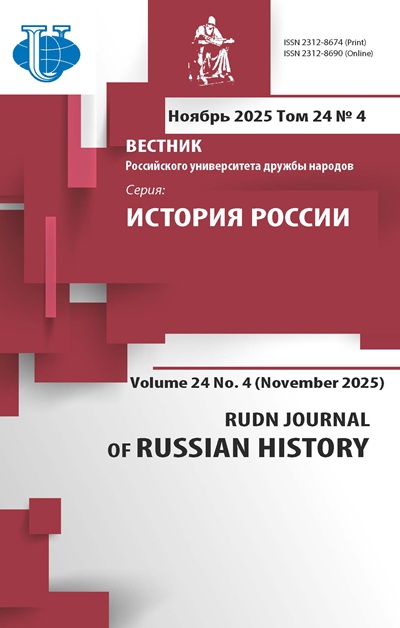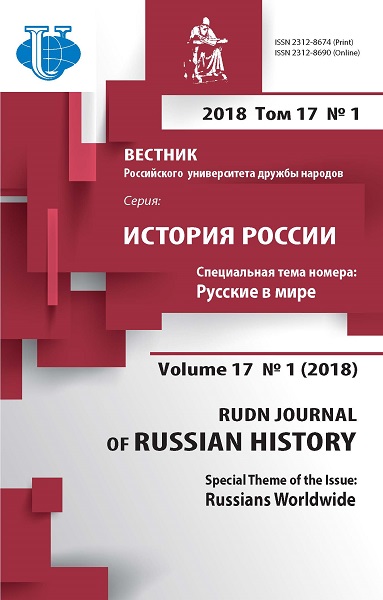Russian community in Spain and cultural dialogue (1991-2015)
- Authors: Ershov V.F1, Gadzhieva K.k.1
-
Affiliations:
- Moscow Region State University
- Issue: Vol 17, No 1 (2018): RUSSIANS WORLDWIDE
- Pages: 92-108
- Section: RUSSIANS WORLDWIDE
- URL: https://journals.rudn.ru/russian-history/article/view/18532
- DOI: https://doi.org/10.22363/2312-8674-2018-17-1-92-108
- ID: 18532
Cite item
Full text / tables, figures
Abstract
The article considers the relevance of studying the Russian community in Spain in the context of Russia’s foreign policy and the development of globalization processes. The author considers the factors of the increase of the Russian-speaking community of Spain at the turn of the 21st century, highlights the key demographic and social parameters of the Russian community in Spain. The article reveals the positive influence of the expansion of the Russian-Spanish cooperation in the sphere of culture and economy in the 2000s on the process of institutionalization of the movement of the Russian compatriots in Spain for the preservation of their cultural and language identity and on the promotion of the Russian culture in Spain. There are distinguished the most important aspects of the social life of the modern Russian-speaking community of Spain: revitalization of joint cultural work of the Russian diplomats, of the representatives of the Russian business in Spain and figures of the foreign Russian community; participation of foreign compatriots in the development of the Russian-Spanish relations at the regional level, including the national republics of the Russian Federation; increase of the share of the Russian-language press, electronic media and social networks in the Spanish information space, etc. The author reveals the role of the Russian compatriots’ community in Spain in the increase of the dialogue of cultures and civilizations, in the international interaction in the educational and economic sphere. There is also analyzed the influence of globalization on the evolution of the socio-cultural image and institutional structure of the Russian diaspora in Spain in the 1990-2000s.
About the authors
Vitaly F Ershov
Moscow Region State University
Author for correspondence.
Email: ershov_vf@mail.ru
выпускник Московского государственного историко-архивного института (1984) и Московского государственного университета имени М.В. Ломоносова (2009), доктор исторических наук (Московский государственный университет сервиса, 2000). С 2014 г. - директор Центра стратегии и аналитики Московского государственного областного университета.
10A Radio St., Moscow, 105005, RussiaKhanym kyzy Gadzhieva
Email: khanym15@mail.ru
independent researcher
References
- Aznar, E. “Revision del concepto tie lejania en un mundo globalizado: Rusia, Asia, Africa у el Pacifko.” Espana, un actor destacado en el ambito international. Madrid: Fundacion para el analisis у los estudios sociales, 2000.
- Bagno, V.E. “Jazyki pogranichnyh kul’tur (Ispanija i Rossija).” [Languages of border cultures (Spain and Russia)]. Pogranichnye kul’tury mezhdu Vostokom i Zapadom (Rossiya i Ispaniya). St. Peterburg: Sankt-Peterburgskiy gosudarstvenny universitet, 2001 (in Russian).
- Bagno, V.E. “Obraz drugogo kak sposob samopoznanija (Rossija i Ispanija).” [The image of the other as a way of self-knowledge (Russia and Spain)]. Vzaimosvyazi i vzaimovliyanie russkoy i evropeyskih literatur. St. Peterburg: St. Petersburg University, 1999 (in Russian).
- Bagno, V.E. Rossija i Ispanija: obshhaja granica. St. Peterburg: Nauka, 2006 (in Russian).
- Bocharova, Z.S. “Russkij mir 1930-h godov: ot rascveta k uvyadaniyu zarubezhnoy Rossii.” [Russian world of the 1930-ies, from blossoming to withering foreign Russia]. In Russkiy mir v XX veke. Vol. 6. Moscow: AIRO-XXI, 2014 (in Russian).
- Bordyugov, G.A., and Kasaev, A.Ch. Russkij mir i Rossija: formirovanie novogo tipa otnoshenij. 1986–2000 gg. [Russian world and Russia: the formation of a new type of relationship. 1986−2000]. Moscow: AIRO-XXI; St. Peterburg: Aleteiya, 2014 (in Russian).
- Chepinickaja, P.R. “Kategorija «sootechestvenniki za rubezhom» v moduse jetnosociologii i setevaja struktura «Russkogo mira».” Theory and practice of social development, no. 8 (2011): 102–104 (in Russian).
- Ershov, V.F. Russkij mir i severokavkazskoe zarubezh’e v XX – nachale XXI veka. Moscow: Infra-M, 2016 (in Russian).
- Fomicheva, Zh.E. at all, eds. Sbornik nauchno-informacionnyh materialov kompleksnyh meroprijatij, posvjashhennyh prazdnovaniju Dnja russkogo jazyka, dlja rossijskih sootechestvennikov i inostrannyh grazhdan, Ispanija, Madrid – Valensija, 3−8 ijunja 2014 g., Bolgarija, Sofija – Burgas, 5−11 oktjabrja 2014 g. Moscow; Tula: Rossotrudnichestvo; Tula state pedagogical university Publ., 2014 (in Russian).
- Gajbarjan, O.E., ed. España y Rusia: diálogo de culturas a través del paradigma de la civilización contemporánea: Materialy Mezhdunarodnoj nauchno-prakticheskoj Internet-konferencii. Krasnoyarsk: Izdatel’stvo Sibirskogo federal’nogo universiteta, 2011(in Russian).
- Massansalvador, Francesc Serra I. Rusia, la otra potencia europea. Barcelona: Bellaterra, 2005.
- Mekhontsev, V. “Rossiyskaya ispanistika: s uverennost’yu v budushhee.” [Russian hispanistics: with confidence to the future]. Vuzovskiy vestnik: Rossiyskaya informacionno-analiticheskaja gazeta. May 16−31, 2008 (in Russian).
- Moseikina M.N. “Russkiy mir na prostranstve Latinskoj Ameriki: potencial russkih immigrantov kak social’no-demograficheskiy, duhovny i agentny resurs.” [Russian world in the space of Latin America: the potential of Russian immigrants as socio-demographic, spiritual and agent-based resource]. Rossija i Iberoamerika v globalizirujushhemsja mire: istorija i perspektivy, 111−118. Vol. 1. St. Peterburg: St. Peterburgskiy gosudarstvenniy universitet, 2014 (in Russian).
- Moseikina M.N. “The fate of literary émigré generations in the context of Russian-Latin America dialogue of cultures.” Izvestia of the Ural federal university. Series 2. Humanities and Arts 18, no. 4 (2016): 55−67 (in Russian).
- Moseikina M.N. “U istokov formirovaniya Russkogo mira, XIX – nachalo XX veka.” [At the origins of formation of the Russian world, of the 19th – early 20th century]. In Russkiy mir v XX veke. Vol. 6. Moscow: AIRO-XXI, 2014 (in Russian).
- Moseikina M.N. “Russkaya emigraciya v stranah Latinskoy Ameriki v 1920−1930-h godah” [Russian emigration in Latin America in 1920−1930s]. Russian history, no. 3, (2010): 80−101 (in Russian).
- Nikonov, V. ed. Smysly i cennosti russkogo mira. Sbornik statej i materialov «kruglyh stolov», organizovannyh Fondom «Russkij mir». Moscow: «Russkij mir», 2010, 101 (in Russian).
- Pchelinov-Obrazumov, A.A. “Obraz Ispanskoy respubliki (1936−1939) v presse rossiyskoy politicheskoy jemigracii.” [The image of the Spanish Republic (1936–1939) in the press of the Russian political emigration]. Nauchnye vedomosti Belgorodskogo gosudarstvennogo universiteta. Istoriya. Politologija. Jekonomika. Informatika 25, no. 1 (2013): 44−52 (in Russian).
- Peunov, A. ed. Russkie v Ispanii [Russian in Spain]. Madrid: Koordinacionnyj sovet russkih sootechestvennikov v Ispanii, 2011 (in Russian).
- Pivovar, E.I. “Zarubezhnaya Rossiya i sovremennoe rossiiskoe obshchestvo v kontekste istoriko-kul’turnogo sotrudnichestva pokolenii. Moscow: Gumanitarii, 2006 (in Russian).
- Pivovar, E.I. Rossiiskoe zarubezh’e: social’no-istoricheskij fenomen, rol’ i mesto v kul’turno-istoricheskom nasledii. Moscow: RSUH Publ., 2008 (in Russian).
- “Rossija i Ispanija otmechajut jubilej.” Mezhdunarodnaja zhizn’, August 12, 2017. https:// iinteraffairs.ru/news/show/16835 (in Russian).
- Sanchez, Fernandez R. “Relaciones comerciales e institucionales de Rusia con la Union Europea.” Informacion Comercial Espanola (ICE), no. 805 (2003): 117−132.
- Semenov, K.K. Russkaya emigraciya i Grazhdanskaya voyna v Ispanii 1936–1939 gg. Moscow: Algoritm, 2016 (in Russian).
- Shabaga, A.V., and Bondarenko, T.V. “Vneshnepoliticheskij aspekt regional’noj politiki Ispanii.” [The foreign policy aspect of the regional policy of Spain]. Vestnik RUDN. International Relations 12, no. 2, (2013): 83−91 (in Russian).
- Volosyuk, O.V. ed. Rossijskie diplomaty v Ispanii. Diplomáticos rusos en España. 1667–2017. Moscow: Mezhdunarodnye otnosheniya, 2016 (in Russian).
- Volosyuk, O.V., and Yurkov, D.V. “O razvitii nauchnyh i kul’turnyh svyazey Rossii i Ispanii na sovremennom etape.” [On the development of scientific and cultural ties between Russia and Spain at the present stage]. Rossiya − Ispaniya − Iberoamerika. Perekrestnyy god sotrudnichestva. Moscow: MGIMO-Universitet, 2011: 59−63 (in Russian).
- Volosyuk, O.V., Bagnó, V., Cuesta, Hernández L.J., Deyá, Bauzá, M. J., Kagané, L., Latorre, J., and Shashkov, Y. “Temas y formas hispánicas: arte, cultura y sociedad.” Pamplona: Universidad de Navarra, 2015.
- Volosyuk, O.V., and Yurkov, D.V. “O razvitii nauchnyh i kul’turnyh svyazey Rossii i Ispanii na sovremennom etape.” [On the development of scientific and cultural ties between Russia and Spain at the present stage]. Rossiya − Ispaniya − Iberoamerika. Perekrestnyy god sotrudnichestva. Moscow: MGIMO-Universitet, 2011: 59−63 (in Russian).
- Volosyuk, O.V., Bagnó, V., Cuesta, Hernández L.J., Deyá, Bauzá, M. J., Kagané, L., Latorre, J., and Shashkov, Y. “Temas y formas hispánicas: arte, cultura y sociedad.” Pamplona: Universidad de Navarra, 2015.
- Yakovlev, P.P. “Ispaniya: tri desyatiletiya dostizheniy i peremen.” [Spain: three decades of achievements and changes]. Latinskaya Amerika [Latin America], no. 10 (2005): 31−36 (in Russian).
- Yakovlev, P.P. “Rossiya i Ispanija na puti k ‘Partnerstvu dlja modernizacii’.” [Russia and Spain on the way to «Partnership for modernization»]. Mezhdunarodnaya ekonomika, no. 6, (2011): 46 (in Russian).
- Уányshev Nésterova, Irina. “El trasfondo institucional de los intereses soviéticos en el Atlántico Centro − Oriental 1965−1971.” Economía y marco institucional (siglos XVI− XX), 209−241. Las Palmas de Gran Canaria: Mapfre Guanarteme, 2014.
- Yurkov, D.V. “Rossiysko-ispanskie kul’turnye svyazi (konec 1970-h gg. − nachalo XXI v.).” [Russian-Spanish cultural relations (end of 1970s – earlt 21st century)]. PhD thesis, RUDN University, 2010 (in Russian).
Supplementary files















